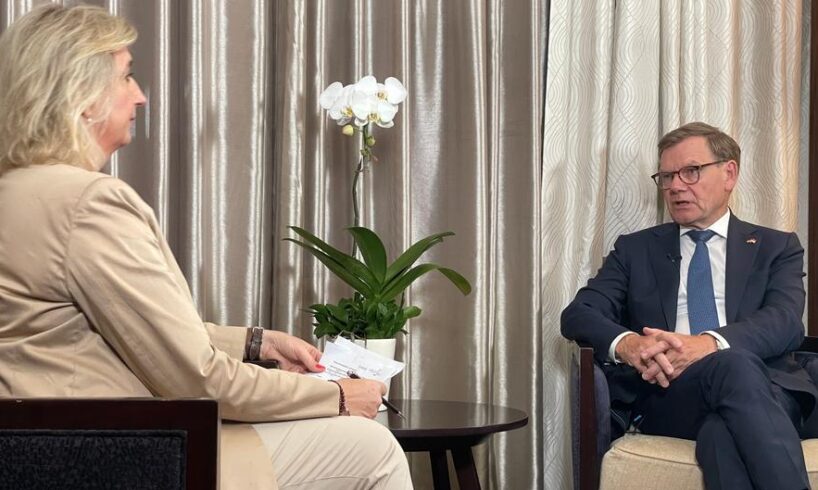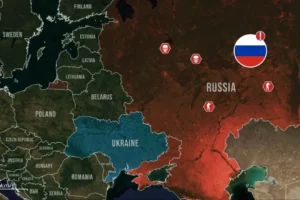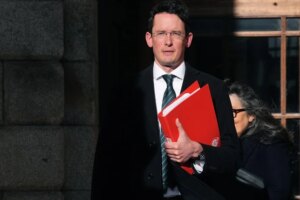
Germany would welcome China taking a more active role in the peace process in Ukraine as negotiations with Russia appear likely to ramp up, Foreign Minister Johann Wadephul told DW on Wednesday.
At the same time, Wadephul also cautioned that Beijing had not appeared interested in such a role, despite explicit appeals from Berlin and other countries.
“Hardly any other country, any other government, has such a strong influence on Russia as China. Unfortunately, China hasn’t used its opportunities so far, but it is never too late,” Wadephul said in an interview with DW’s Rosalia Romaniec.
Wadephul visited Expo 2025 in Osaka, and particularly the EU’s exhibition, prior to departing for IndonesiaImage: Soeren Stache/dpa/picture alliance
The German minister is currently visiting Indonesia as part of his Asia tour that also included a two-day stop in Japan.
“China defines its own role,” Wadephul said during the interview. “China is an important country, a huge country which can have a lot of political influence, that has a lot of economic influence and is a permanent member of the UN Security Council. And for a long time now, we’ve been calling on China to use these opportunities to help ensure the war is ended.”
Wadephul added that he had raised the issue during his most recent conversation with his Chinese opposite number Wang Yi and said he would be “very pleased if this appeal was heard in Beijing.”
Hopes for peace talks rise amid positive signals from Trump, Putin, Zelenskyy
The conservative politician expressed optimism about the latest push for talks aimed at stopping the fighting in Ukraine. He praised US President Donald Trump both for trying to bring Russian President Vladimir Putin to negotiations, and for talking about security guarantees for Ukraine.
“There’s a good chance that this is a step towards security and peace,” Wadephul said. “But now everyone’s waiting to see whether Vladimir Putin is genuinely ready to preside over an end to this war. Unfortunately, things are still looking very different on the battlefield.”
“There are obvious doubts, because President Putin has not yet said ‘yes’ to negotiations. President Zelenskyy said he is ready to hold a bilateral meeting with Putin, and then a trilateral meeting with President Trump. Where is the ‘yes’ from Putin?”
Wadephul warned that if Putin was not willing to negotiate, this would lead to further sanctions on Russia, saying he believed that both Europe and the US were ready to pursue this course of action if necessary.
He also said that given these uncertainties, it was too early to discuss issues like the German deployment of troops as part of any possible security guarantees, but stressed Germany “has so far never failed to show its readiness to take responsibility in this conflict.”
Switzerland floated as potential venue
Wadephul said Berlin did not have “any ambition” to host potential talks.
“We don’t see our greatest contribution as being the venue for the talks. The most important thing is that they take place. There are many good venues in Europe for them to be held,” he said. “I think it should be as neutral as possible. That’s why Switzerland has always been good in the past.”
German FM has doubts Putin will meet with Zelenskyy
To view this video please enable JavaScript, and consider upgrading to a web browser that supports HTML5 video
During his press conference with Indonesian Foreign Minister Sugiono, Wadephul also stressed that it should be “Russia and Ukraine” shaping such decisions, “not the German foreign minister from Jakarta.”
How Ukraine war fuels fears in Asia
Wadephul told DW that one message he had brought with him to Asia, which he felt was also understood in the region, was how various crises around the world were interconnected, “and either we defend the international, rules-based order and peace together, or we lose this battle.”
“And that’s exactly why I said here that a peaceful situation in the Taiwan Strait, for example, is as important for regional stability as it is for the global economy and also for economic and security policy in Europe,” Wadephul said, adding that people in Asia “appreciate that Germany recognizes these issues.”
Amid peace efforts, fighting in Ukraine rages on
To view this video please enable JavaScript, and consider upgrading to a web browser that supports HTML5 video
He cited the coalition of 30 countries supporting Ukraine, including Asian countries like Japan, as evidence of how “many nations are now prepared to work together.”
“So by the same token, this region has the right to demand solidarity from us,” as “new global partnerships are being created,” Wadephul said.
Expanding Indonesian trade as part of China ‘de-risking’ strategy?
Bilateral trade between Indonesia and Germany has been growing rapidly in recent years. However, Indonesia — despite its population of some 285 million — is only 50th on the list of German international trade partners.
But trade ties might ramp up as Germany and the EU seek to “de-risk” and become less dependent on China for certain core products like rare earths. More than 90% of Germany’s rare earth supply currently hails from China.
“We’re not talking about decoupling … that would be separation from China,” Wadephul stressed, noting how Beijing was also looking to diversify its sources for certain imports. “But what we’re seeing now in new and current restrictions in the delivery of rare earths from China reinforces our quest for new trade partners.”
He described Indonesia as a “good, new, and I think, reliable trade partner.”
DW’s Rosalia Romaniec conducted the interview in Jakarta.





